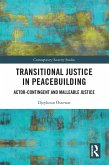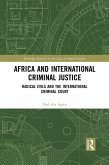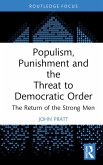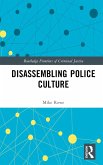This book provides an analysis of how penal discourses are used to legitimate post-Cold War military interventions through three main case studies: Kosovo, Iraq and Libya. These cases reveal the operation of diverse modalities of punishment in extending the ambit of international liberal governance.
The argument starts from an analysis of these discourses to trace the historical arc in which military interventions have increasingly been launched through reference to both the human rights discourse and humanitarian sentiments, and a desire to punish the perpetrators. The book continues with the analysis of practices involved in the post-intervention phase, looking at the ways in which states have been established as modes of governance (Kosovo), how punitive atmospheres have animated soldiers' violence in the conduct of war (Iraq), and finally how interventions can expand moral control and a system of devolved surveillance in conjunction with both border control and the engagement of the International Criminal Court (Libya). In all these case, tensions and ambiguities emerge. These practices underscore how punitive intents were also present in the expansion of liberal governance, demonstrating how the rhetoric of punishment was useful in legitimating Western state powers and recomposing the borders of the liberal world at the periphery.
War as Protection and Punishment ends with a number of critical comments on the diffusion of punitive discourse in the international arena, considering how issues of crime and justice have also animated, at least in part, the current engagement with the Russian invasion of Ukraine. An accessible and compelling read, this book will appeal to students and scholars of criminology, sociology, politics and those interested in how penal discourses are used to legitimize military conventions.
The argument starts from an analysis of these discourses to trace the historical arc in which military interventions have increasingly been launched through reference to both the human rights discourse and humanitarian sentiments, and a desire to punish the perpetrators. The book continues with the analysis of practices involved in the post-intervention phase, looking at the ways in which states have been established as modes of governance (Kosovo), how punitive atmospheres have animated soldiers' violence in the conduct of war (Iraq), and finally how interventions can expand moral control and a system of devolved surveillance in conjunction with both border control and the engagement of the International Criminal Court (Libya). In all these case, tensions and ambiguities emerge. These practices underscore how punitive intents were also present in the expansion of liberal governance, demonstrating how the rhetoric of punishment was useful in legitimating Western state powers and recomposing the borders of the liberal world at the periphery.
War as Protection and Punishment ends with a number of critical comments on the diffusion of punitive discourse in the international arena, considering how issues of crime and justice have also animated, at least in part, the current engagement with the Russian invasion of Ukraine. An accessible and compelling read, this book will appeal to students and scholars of criminology, sociology, politics and those interested in how penal discourses are used to legitimize military conventions.
"Teresa Degenhardt's analysis of how penal discourses animate post-Cold War military interventions represents a persuasive and original theoretical advance in the study of war, punishment and governance. Her case studies of Kosovo, Iraq and Libya reveal the operation of diverse modalities of punishment to extend the ambit of international liberal governance. It is a 'must read' for anyone interested in the war and crime nexus."
Ruth Jamieson, Honorary lecturer in Criminology at Queen's University Belfast
"In this magistral new book, Degenhardt powerfully shows how, as Beccaria had constituted the modern liberal State around the power to punish, so today the global Western State is relying on the power to punish for the construction of its legitimation. On the basis of a careful analysis of events in Kosovo, Libya and, particularly jarring, Iraq, Degenhardt shows the incredible political strength of a rhetoric of power and punishment, particularly relevant today when the struggle around the contours of the global State in Ukraine is often grounded in the claim to bring war as "punishment"."
Dario Melossi, Alma Mater Professor, University of Bologna, and Distinguished Affiliated Scholar, University of California, Berkeley
"This is a powerful and satisfying book. It examines how military interventions are driven by both the attempt to protect human rights and by the desire to punish perpetrators. Through a careful analysis of the leading post-Cold War cases, Degenhardt reveals the ambiguities of delivering protection and punishment through violence."
Prof. Roberto Belloni, University of Trento, Italy
"Writing on the cusp of fields as wide as criminology, international relations, and war studies, Teresa Degenhardt analyses in remarkable depth the forms of -and justifications for- international military intervention in the age which, we were told, had arrived at the 'end of history'. This is a must read for students and researchers in the above fields, and for all those who are beginning to wonder about the future of the 'end of history'."
Ronnie Lippens, formerly Professor of Criminology at Keele University, UK
Ruth Jamieson, Honorary lecturer in Criminology at Queen's University Belfast
"In this magistral new book, Degenhardt powerfully shows how, as Beccaria had constituted the modern liberal State around the power to punish, so today the global Western State is relying on the power to punish for the construction of its legitimation. On the basis of a careful analysis of events in Kosovo, Libya and, particularly jarring, Iraq, Degenhardt shows the incredible political strength of a rhetoric of power and punishment, particularly relevant today when the struggle around the contours of the global State in Ukraine is often grounded in the claim to bring war as "punishment"."
Dario Melossi, Alma Mater Professor, University of Bologna, and Distinguished Affiliated Scholar, University of California, Berkeley
"This is a powerful and satisfying book. It examines how military interventions are driven by both the attempt to protect human rights and by the desire to punish perpetrators. Through a careful analysis of the leading post-Cold War cases, Degenhardt reveals the ambiguities of delivering protection and punishment through violence."
Prof. Roberto Belloni, University of Trento, Italy
"Writing on the cusp of fields as wide as criminology, international relations, and war studies, Teresa Degenhardt analyses in remarkable depth the forms of -and justifications for- international military intervention in the age which, we were told, had arrived at the 'end of history'. This is a must read for students and researchers in the above fields, and for all those who are beginning to wonder about the future of the 'end of history'."
Ronnie Lippens, formerly Professor of Criminology at Keele University, UK








